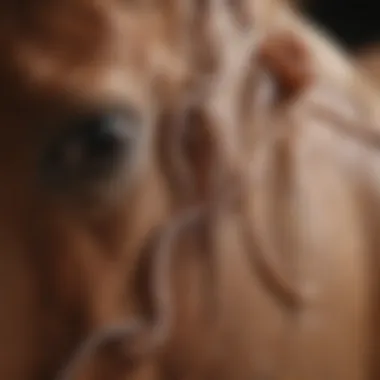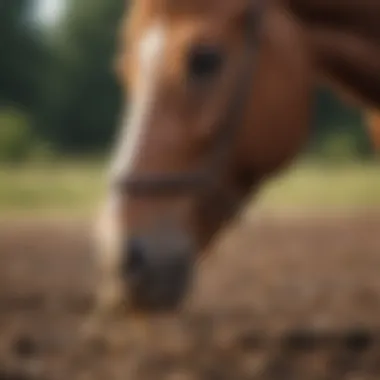Essential Guide to Horse Roundworm Treatment Options


Intro
Horse roundworms, scientifically known as Parascaris equorum, are common nematodes that significantly impact the health of equines worldwide. Understanding this parasite is crucial for horse owners and caregivers, as these worms can cause serious health complications if left untreated. This section provides a foundational overview of the topic, highlighting the importance of effective detection, treatment, and prevention strategies.
Roundworms are particularly problematic for young horses, but any age can be affected. Their life cycle involves several stages, including eggs, larvae, and adult worms. These stages present different challenges in terms of management. This article will explore ways to identify roundworm infections, various treatment methods, and tips for preventing future infestations.
The complexity of managing equine health requires a solid understanding of both the biological aspects of roundworms and practical approaches to care. Therefore, this guide is designed to offer a comprehensive examination of horse roundworm treatment, ensuring that horse owners can make informed choices.
Animal Profile
General Overview
Horses are unique animals with a variety of life stages and needs. Understanding these aspects is essential when addressing potential health issues such as roundworm infections. Roundworms predominantly inhabit the small intestine of horses, causing various symptoms, including poor growth rates, colic, and, in severe cases, even death.
Habitat and Distribution
Horse roundworms are typically found in habitats where horses are raised, including pastures, stables, and any area where horse manure is present. The transmission often occurs in environments where the eggs can thrive in moist and warm conditions. This makes preventive measures like cleaning and managing horse waste essential to minimize risk.
Fascinating Facts
Unique Traits and Adaptations
Roundworms have adapted well within equine hosts, showcasing resilience and reproductive efficiency. Their eggs are remarkably durable and can withstand harsh environmental conditions. This adaptability allows them to persist within populations, challenging equine health management efforts.
Historical and Cultural Significance
In many cultures, horses symbolize strength, freedom, and companionship. The presence of roundworms has historically troubled equine management, pushing veterinarians and researchers to develop effective treatment strategies. Understanding the historical management of this parasite can provide context for modern practices.
Conservation Status
Current Population Trends
While horse roundworms are not endangered, their prevalence can affect horse populations, particularly in domesticated environments. Continuous monitoring is essential, as untreated infestations can lead to larger outbreaks and even contribute to the decline of healthy equine populations.
Threats and Challenges
The primary threat posed by horse roundworms is their impact on equine health. Factors like improper deworming practices, resistance to treatments, and lack of awareness greatly exacerbate the challenge. Addressing these threats requires a multifaceted approach, including education for horse owners and better veterinary practices.
Care Tips for Pet Owners
Basic Needs and Requirements
To effectively manage horse roundworm risks, equine caregivers must ensure proper nutrition and housing. A balanced diet helps to maintain overall health, while clean living conditions reduce exposure to the parasite. Regular veterinary check-ups will also aid in early detection.
Health and Wellness Tips
- Routine Deworming: Establish a deworming schedule based on veterinary recommendations to minimize roundworm infestations.
- Environmental Management: Clean pastures regularly and rotate grazing areas to disrupt the life cycle of the roundworms.
- Monitor Health: Keep a close eye on your horse's health and behavior. Early signs of distress can lead to prompt interventions.
Understanding Horse Roundworms
Horse roundworms are significant parasites that pose considerable threats to equine health. Understanding these organisms is essential not only for horse owners but also for veterinarians and caregivers. Gaining insight into roundworms facilitates better management practices, timely treatments, and informed decisions regarding horse care.
Knowing about the intricacies of roundworm behavior, their life cycles, and the specific types most common to horses is crucial. An informed approach can mitigate risks and enhance the well-being of the animals involved. Recognizing the risk factors and impacts on health can also aid in implementing effective preventive measures.
Overview of Roundworms
Roundworms, scientifically known as nematodes, are common parasites found in various hosts, particularly in horses. The most notorious species affecting equines is Parascaris equorum. These large, parasitic worms reside in the intestines of horses and can lead to serious health complications if left unchecked.
The adult roundworms can grow up to 15 inches in length and are usually yellowish-white or brownish in color. Their presence can cause symptoms such as colic, weight loss, and stunted growth in young horses. Adult horses may be somewhat more resistant, but they still can harbor infections and shed eggs in their feces.


Understanding the biology of roundworms helps in recognizing their impact on overall horse health and aids in formulating effective treatment plans.
Life Cycle of Horse Roundworms
The life cycle of horse roundworms is complex and consists of several stages. The process begins when a horse ingests roundworm eggs present in contaminated feed, water, or pasture. Once inside the intestine, these eggs hatch into larvae.
The key stages are:
- Eggs are laid in the horse's intestine.
- Larvae hatch from the eggs and can migrate through the body, including the liver and lungs, before returning to the intestine.
- Upon reaching maturity in the intestine, the adult worms reproduce, continuing the cycle.
This life cycle can take around ten weeks from egg ingestion to adult worm production. Adopting comprehensive management strategies can reduce exposure to these parasites and mitigate their effects effectively.
Types of Roundworms Affecting Horses
There are several types of roundworms that can inflict harm on horses. The most common include:
- Parascaris equorum: Most prevalent in foals and young horses, causing respiratory and gastrointestinal issues.
- Strongylus vulgaris: Known for its ability to migrate through blood vessels, leading to severe complications such as colic.
- Strongyloides westeri: Associated with disease in foals, these worms can be transmitted through the milk from mares to their offspring.
- Ascaris suum: Though primarily affecting pigs, this worm can occasionally impact horses.
Recognizing the presence of these different roundworm species is vital for effective diagnosis and treatment. Identifying the specific type can guide tailored treatment, ensuring the health of the horse is prioritized.
Identifying Roundworm Infestation
Understanding how to identify a roundworm infestation in horses is crucial for effective treatment and management. Recognizing the signs early can prevent severe health complications. Roundworms can affect horses of all ages, and their impact on equine health can be significant. Therefore, awareness of symptoms and appropriate diagnostic methods is essential for horse owners and caregivers.
Symptoms of Infection
Symptoms of roundworm infestation can vary. Many horses may show no signs, especially in the early stages. However, some common symptoms to observe include:
- Weight Loss: Despite normal appetite, infected horses may lose weight.
- Poor Coat Condition: Their coat may appear rough or unkempt.
- Coughing: This can occur if larvae migrate to the lungs.
- Colic: Abdominal pain may arise from intestinal blockage.
- Diarrhea: This can also be a sign of infection, particularly in young horses.
- Lethargy: A general lack of energy or enthusiasm.
It's important to note that these symptoms may also be attributed to other health issues, making proper diagnosis vital.
Diagnosis Methods
Diagnosing roundworm infestation requires a careful approach. Several methods can assist vets in confirming the presence of these parasites:
- Fecal Egg Count: The most common method involves analyzing a fecal sample for roundworm eggs. A positive finding indicates a current infestation.
- Blood Tests: Blood tests can check for antibodies against parasites, helping identify previous exposure.
- Physical Examination: A thorough physical exam by a veterinarian can reveal gastrointestinal distress, poor coat condition, or abnormal weight.
Importance of Timely Diagnosis
Timely identification of roundworm infestations can help implement effective treatments. Regular fecal checks, especially for young or newly acquired horses, are encouraged. This proactive approach can significantly enhance the overall health and well-being of horses.
"Routine monitoring and early diagnosis are key to keeping equine health in check."
For further education on parasite management," Wikipedia" is a helpful resource.
Treatment Options for Horse Roundworms
Addressing horse roundworm infestations is critical for the health and performance of equines. Treatment options directly impact the welfare of horses as roundworms can lead to significant health challenges. Understanding available methods enhances the ability of owners and caregivers to implement effective strategies. Key factors in treatment include the choice of de-worming medications, understanding treatment protocols, and familiarizing oneself with administration methods. A thoughtful approach to roundworm treatment can mitigate the risks associated with infestations.
De-worming Medications
De-worming medications are essential tools in the fight against horse roundworms. Common treatments include ivermectin, fenbendazole, and pyrantel pamoate. Each medication has its mechanism of action, and effectiveness can vary based on the specific roundworm species.
- Ivermectin: This is perhaps the most known de-wormer. It is effective against many types of parasites, including adults and immature stages of roundworms. Its convenience as a paste, injectable, or oral form makes it a favored choice among horse owners.
- Fenbendazole: This medication has a unique capability to target specific developmental stages of roundworms. It can be effective in some cases where other medications may fail.
- Pyrantel pamoate: This is effective against adult roundworms and is often used in young horses, offering a valuable option in the early stages of life.
Each de-wormer comes with its benefits and potential side effects, so consulting a veterinarian is vital in determining the most suitable treatment for individual horses.
Comparison of Treatment Protocols


Different treatment protocols exist, reflecting various approaches to managing roundworm infestations. The protocols often focus on the frequency of treatments and the types of medications used.
- Rotational Deworming: This protocol involves switching between de-wormers over a period to prevent resistance build-up. This method often combines two or more medications, optimizing efficacy.
- Targeted Deworming: This method relies on fecal examinations to identify the presence and type of parasites. Based on this information, specific medications can be selected, minimizing unnecessary treatments and reducing the risk of resistance.
- Routine Deworming: Some horse owners prefer a set schedule regardless of fecal tests. Although simpler, it may lead to the overuse of certain medications, resulting in resistance.
Comparing these protocols helps in selecting a personalized approach for each horse. The choice can depend on the horse's health status, lifestyle, and previous infestations.
Administration Methods
Properly administering de-worming medications is crucial to ensuring their effectiveness. Various methods exist, each with its advantages. Owners should be knowledgeable about the options available.
- Oral Administration: This is the most common method. Medications can be given as a paste or powder mixed into feed. Ensuring the horse consumes the full dose can be a challenge, especially for picky eaters.
- Injectable: Some de-wormers come in injectable form. This can be more reliable for administering the correct dose but requires experience and sometimes a veterinarian’s expertise.
- Topical: Certain medications can be applied to the skin. This method can be effective and reduces stress for both the horse and owner.
It is vital to follow the manufacturer's instructions regarding dosage and frequency for effective treatment. Proper administration ensures that the horse receives the full benefit of the medication, reducing the likelihood of resistance development or treatment failure.
Deworming is not a one-size-fits-all approach. Understanding your horse’s individual needs is crucial for effective management.
Challenges in Treating Roundworm Infections
The treatment of horse roundworm infections poses various challenges that must be managed effectively to ensure the health of the affected animals. Understanding these challenges is crucial for equine caregivers and veterinarians. They can influence treatment success and overall horse well-being. This section will address two critical areas: resistance to dewormers and the timing and frequency of treatments.
Resistance to Dewormers
Resistance to dewormers is a significant issue in the management of roundworm infections. Over time, there has been an increase in the prevalence of resistant roundworm populations. This resistance can lead to treatment failures, requiring higher doses or alternative medications. Such changes increase costs and may complicate management strategies.
Several factors contribute to the development of resistance:
- Overuse of Dewormers: Frequent and indiscriminate use can promote survival of resistant worms.
- Suboptimal Dosage: Underdosing can enable some worms to survive treatment.
- Lack of Rotation: Not changing deworming agents can help selected resistant individuals thrive.
It is crucial for horse owners to engage in strategic deworming practices. This includes rotating different classes of dewormers and conducting regular fecal egg count tests. Maintaining a record of treatments helps identify patterns and problems related to resistance. Seeking the advice of a veterinarian is also essential.
Regular monitoring of deworming protocols can significantly reduce the risk of developing resistant roundworm populations.
Timing and Frequency of Treatments
The timing and frequency of deworming treatments are pivotal in achieving effective roundworm management. Incorrect timing can lead to reinfection, while an inappropriate frequency can either foster resistance or compromise horse health.
Considerations for proper timing include:
- Life Cycle Awareness: Understanding the life cycle of roundworms helps determine optimal treatment times. For example, young horses are often more susceptible, necessitating early intervention.
- Seasonal Trends: Environmental factors, such as weather conditions, can influence roundworm prevalence. Treatment should be aligned with these trends to minimize infestations.
As for frequency:
- Routine Protocols: Many horse owners adopt a predetermined schedule. This may need adjustments based on fecal testing results and specific farm management practices.
- Observation of Symptoms: Any behavioral changes in horses should trigger re-evaluation of the treatment plan.
Consistency in monitoring and adapting treatment schedules can lead to successful roundworm management and help prevent future infestations. Engaging with veterinarians for tailored strategies enhances the efficacy of treatments and overall horse health.
Preventive Measures
Preventive measures are crucial in managing horse roundworm infestations. This section focuses on strategies that can help minimize the risk of infection and limit the impact on equine health. Implementation of effective measures not only protects individual horses but also contributes to the overall well-being of the herd. Key components include worming strategies, environmental management, and ongoing monitoring.
Effective Worming Strategies
Worming is the cornerstone of roundworm prevention. It involves administering dewormers at appropriate intervals to eradicate existing parasites and prevent reinfestation. Here are some important considerations:
- Timing: Timing of treatments should coincide with the life cycle of roundworms to ensure maximum effectiveness.
- Ivermectin: Ivermectin-containing products are commonly used for treatment. They target various stages of roundworms, making them effective choices.
- Rotation of Dewormers: Regularly rotating the class of dewormers used is important. This helps to reduce the risk of resistance developing among parasites.
An example of a common schedule includes:
- Initial deworming after weaning
- Follow-up treatments every 8-12 weeks, as needed


By establishing a structured deworming plan, horse owners can significantly reduce the threat posed by roundworms.
Environmental Management
Maintaining a clean environment is essential for preventing roundworm infestations. The life cycle of roundworms complicates matters, as they can survive in soil and feces. Effective environmental management includes:
- Regular Manure Removal: Clear manure from pastures regularly to minimize the chance of larvae developing.
- Pasture Rotation: Rotating pastures reduces the risk of contamination. Keeping horses away from heavily infested areas helps break the cycle.
- Proper Waste Disposal: Dispose of manure in a manner that minimizes environmental contamination. Options include composting or using designated waste areas far from grazing zones.
Adopting these practices contributes to a healthier habitat for horses and reduces long-term health risks.
Monitoring and Follow-Up Care
Ongoing monitoring and follow-up care are vital components of an effective preventive strategy. This involves observing horse health and regularly assessing their parasite load.
- Routine Fecal Exams: Conduct fecal exams to assess the presence of roundworm eggs. This can be done every six months to identify the need for treatment.
- Health Observations: Watch for signs of infestation, such as weight loss, poor coat condition, and lethargy. Early detection leads to timely interventions.
- Record Keeping: Maintain detailed records of deworming schedules and fecal results. This helps in tracking effectiveness and making informed decisions for future treatments.
Regularly engaging in preventive practices can mitigate the impact of roundworms on equine health and performance.
Role of Veterinary Care
Veterinary care plays a crucial role in managing horse roundworm infestations. The complexity of these infections necessitates expertise that only trained professionals can provide. Regular consultations with a veterinarian ensure that horse owners have access to the latest information on de-worming practices, resistance monitoring, and overall equine health. This collaboration allows for the development of tailored plans that address the specific needs of each horse, thus optimizing treatment efficacy.
Consultations and Tailored Plans
Consultations with veterinarians are essential for creating effective management plans. A qualified vet can assess the horse's condition, conduct fecal exams, and recommend appropriate de-worming schedules. Such consultations help owners understand the specific risks associated with roundworms in their area. For instance, some regions may have higher prevalence rates of infections. A tailored plan should also take into account the age, health status, and lifestyle of the horse.
- Assessment: Routine health checks and fecal analysis can identify existing parasitic burdens.
- Deworming Protocols: A tailored approach considers factors like weight and age for accurate dosing.
- Monitoring: Follow-up visits can track effectiveness and adjust treatments as necessary.
Ensuring a customized approach is vital for reducing the risk of resistance to dewormers and improving the overall health of the horse.
Long-term Health Management
Long-term health management minimizes the chances of recurring roundworm infections. A veterinarian can guide horse owners on maintaining an effective strategy that goes beyond immediate treatment. This may include regular monitoring, environmental management, and possibly the rotation of different classes of dewormers.
- Routine Monitoring: Regular fecal testing helps build knowledge on the parasite load.
- Integrated Practices: Combining deworming with good nutrition and environmental hygiene enhances overall health.
- Educating Owners: Vets can provide valuable insights into signs of infections, allowing for early intervention.
Establishing a long-term care plan involves understanding the horse’s environment and making necessary adjustments to reduce the risk of reinfection. By working closely with a veterinarian, horse owners can ensure their animals stay healthy and thrive.
Research and Developments
Research and developments in the field of horse roundworm treatment are crucial for enhancing the health of horses and ensuring effective management of infections. As the threat of resistance against conventional dewormers increases, scholars and veterinarians are driven to find innovative approaches to mitigate the impact of these parasites. Knowledge regarding the evolving nature of horse roundworm infestations encourages more targeted and efficient treatment protocols, fostering a proactive approach to equine health management.
Emerging Treatments
In recent years, various emerging treatments have become available for managing horse roundworm infections. These treatments often include novel compounds that show promise in overcoming the issues related to resistance. For example, treatment options such as moxidectin and prazequantel have drawn attention due to their efficacy against resistant strains of roundworms.
Another area of exploration involves the use of natural alternatives. Herbal remedies and probiotics are being studied for their potential to support conventional treatments. These options aim to improve gut health and enhance the overall immune response in horses, which could lessen the susceptibility to roundworm outbreaks.
Regular updates from veterinary pharmacology and research are essential to stay informed about the latest innovations. Keeping abreast of ongoing trials and reviews helps horse owners and caregivers make educated decisions regarding deworming regimens. The emphasis on individualized treatment based on specific herd needs becomes paramount as new data emerges.
Field Studies and Their Implications
Field studies play an essential role in understanding the dynamics of roundworm infestations and the effectiveness of treatment strategies. By examining specific populations, researchers gain insights into the prevalence and distribution of different roundworm species. Such studies can help identify what deworming methods yield the best outcomes in terms of decreasing parasite loads.
Moreover, field studies highlight the consequences of improper management and treatment practices. They often show a direct correlation between the timing of treatments and the rising cases of resistance. The information gathered is vital for developing guidelines that assist veterinarians and horse owners in implementing evidence-based practices for parasite control.
Research in the field not only reveals data but also shapes the future of deworming protocols. Understanding local ecology and the life cycles of parasites helps in tailoring effective management plans.
As evidence accumulates, it forms a foundation for more refined approaches. With increased attention to ongoing research and field studies, stakeholders can work collaboratively towards sustainable equine health management, ultimately benefitting the horses under their care.
Closure
The conclusion of this guide consolidates the crucial information presented regarding horse roundworm treatment. It underscores the importance of addressing roundworm infestations effectively to ensure the well-being of horses. Roundworms have a significant impact on equine health, leading to various complications if left untreated. Therefore, understanding how these parasites operate, recognizing signs of infection, and knowing treatment options are vital for horse owners and caregivers.
The following elements highlight the importance of effective management:
- Routine Deworming: Establishing a regular deworming schedule is key. Consistency in procedures minimizes the likelihood of infestation and builds resistance among horse populations.
- Veterinary Guidance: Collaborating with veterinarians leads to tailored treatment programs, optimal dewormer selection, and ongoing monitoring.
- Environmental Control: Managing the horse's environment contributes significantly to reducing the chances of reinfestation.
- Awareness of Emerging Research: Keeping informed about new treatments and developments can enhance treatment strategies and improve overall management practices.















